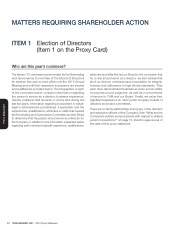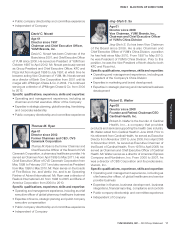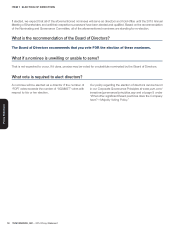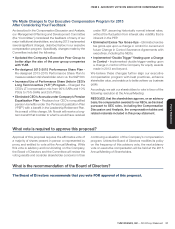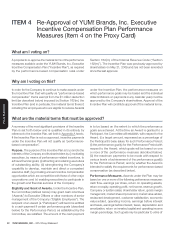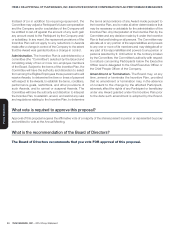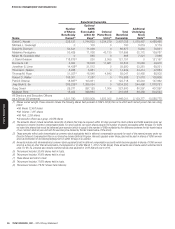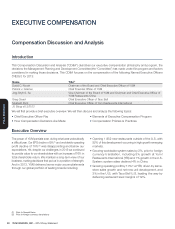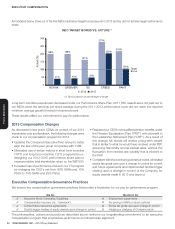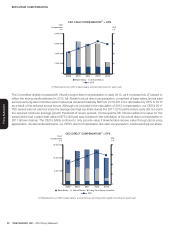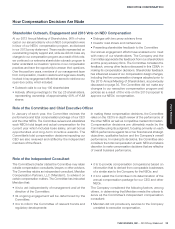Pizza Hut 2013 Annual Report Download - page 45
Download and view the complete annual report
Please find page 45 of the 2013 Pizza Hut annual report below. You can navigate through the pages in the report by either clicking on the pages listed below, or by using the keyword search tool below to find specific information within the annual report.
YUM! BRANDS, INC.-2014Proxy Statement 23
Proxy Statement
ITEM4RE-APPROVAL OF YUM! BRANDS, INC. EXECUTIVE INCENTIVE COMPENSATION PLAN PERFORMANCE MEASURES
business, subsidiary, or other unit or may be based on the
Company or franchise system generally� These measures
may be particular to a line of business, a subsidiary of the
Company, or other units or may be based on the Company
or franchise system generally�
Performance-Based Compensation. A federal income
tax deduction will generally be unavailable for annual
compensation in excess of $1 million paid to the chief
executive officer and any of the three next most highly
compensated officers (other than the chief financial officer)
of a public corporation. However, amounts that constitute
“performance-based compensation” are not counted toward
the $1 million limit. The Committee may designate any
Award under the Plan as intended to be “performance-
based compensation.”
If an Award is designated as performance-based
compensation, the Committee must certify that the
performance goal(s) and other material terms of the Award
have been attained before the Award can be paid. The
Committee may adjust the amount of a Participant’s Award
for individual performance on the basis of such quantitative
and qualitative performance measures and evaluations as
it deems appropriate and may make such adjustments as
it deems appropriate in the case of any Participant whose
position with the Company has changed during the applicable
performance period. The Committee will have the discretion
to adjust performance goals and the methodology used to
measure the determination of the degree of attainment of
such goals; provided, however, that, to the extent required
by the requirements applicable to performance-based
compensation, a performance-based Award may not be
adjusted in a manner that increases the value of such Award.
The maximum payment of an Award that is intended to
be performance-based compensation will not exceed
$10,000,000 in any calendar year.
Payments. A Participant’s eligibility for payment with respect
to an Award for a Performance Period will be determined
by the Committee. Payments will be made in cash and,
unless otherwise provided by the Committee, will be paid
no later than March 15th of the calendar year following the
calendar year in which the applicable performance period
ends. Ifa Participant’s termination of employment occurs
prior to the end of a performance period, any Award made to
the Participant for that performance period will be forfeited;
provided, however, that special rules, including special
payment timing rules, apply in the case of termination on
account of death or disability and special calculation rules
apply in the event the date of termination occurs on account
of the Participant’s normal retirement.
Withholding Taxes. The Company will have the right to
deduct from all payments under the Incentive Plan any taxes
required to be withheld with respect to such payments.
Change in Control. In the event of a change in control of
the Company (as defined in the YUM! Brands, Inc. Long
Term Incentive Plan (the “LTIP”), the Performance Period will
be deemed to have concluded on the date of the change
of control and, within 10 business days thereafter, each
Participant will receive a pro rata amount (based on the
number of days in such Performance Period elapsed through
the date of the change of control) equal to the greater of the
Participant’s target amount or the amount the Participant
would have earned for the Performance Period assuming
continued achievement of the relevant performance goals
at the rate achieved as of the date of the change of control.
Any former Participant in the Plan who was granted an Award
for the period in which a change in control of the Company
occurs and whose employment with the Company was
involuntarily terminated (other than for cause) during a period
that a Potential Change in Control (as defined in the LTIP) is
in effect and within one year preceding the occurrence of
a change in control will be paid the amount of such annual
incentive award as if the Company had fully achieved the
applicable performance target(s) for the Performance Period
in which the change in control occurs, which amount will be
paid to the former Participant 10 business days following
the occurrence of the applicable change in control.
Return of Overpayments. The Incentive Plan provides
that if an amount paid is based on attainment of a level
of objective performance goals that was overstated as a
result of misconduct (defined in the Incentive Plan) by an
employee of the Company or a subsidiary of the Company,
with the result that the payment of the Award was larger
than it should have been, the Participant (whether or not
employed) whose misconduct caused the inaccuracy will
be required to repay the excess. In addition, the Committee
may require an active or former Participant (regardless of
whether then employed) to repay the excess previously
received by that Participant if the Committee concludes
that the repayment is necessary to prevent the Participant
from unfairly benefiting from the inaccuracy; provided,
however, that (a) this repayment obligation will apply to an
active or former Participant only if the Committee reasonably
determines that, prior to the time the amount was paid
(or, if payment of the amount is electively deferred by the
Participant, at the time the amount would have been paid
in the absence of the deferral), such Participant knew or
should have known that the amount was greater than it
should have been by reason of the inaccuracy, and (b) the
amount to be repaid by the Participant may not be greater
than the excess of (i) the amount paid to the Participant over
(ii) the amount that would have been paid to a Participant in
the absence of the inaccuracy (taking into account, at the
discretion of the Committee, only the inaccuracy of which
the Participant knew or should have known, and which
the Participant knew or should have known was caused
by misconduct).



